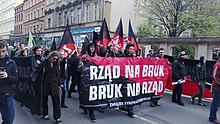Anarchism in Poland
Anarchism in Poland first developed at the turn of the 20th century under the influence of anarchist ideas from Western Europe and from Russia.
In the following years similar organizations established themselves in Gniezno, Warsaw, Łódź, Siedlce, Częstochowa, Kielce, and other towns.
[3] Significant Polish theorists of anarchism and anarcho-syndicalism included Edward Abramowski (1868–1918), Jan Wacław Machajski (1866–1926), Augustyn Wróblewski (1866–1923) and Rafał Górski (1973–2010).
They refused military and state service, condemned the death penalty, and rejected the possibility of having landed estates benefiting from the serfdom of peasants.
It leaned towards the idea of communal administration, and thus the self-government of communes, combining democratic freedom and equality with a strong moral bond.
Although Polish democrats were not too interested in Proudhon's works, the views of the Pan-Slavist Mikhail Bakunin were warmly received.
However, when Józef Tokarzewicz joined the organization, he created a new program, the idea of the stateless nature of the future Polish society, present in the Bakuninist version, was abandoned.
The biggest actions of the conflict were: the successful attack on the district office in Krynki, where the anarchists managed to obtain large amounts of passport forms; shooting the chief of the Białystok police; an attempt to assassinate the scab-employing factory owner Kogan in 1904.
In 1906, they created a strong federation that included Polish and Jewish weavers, tanners, furriers, tailors and carpenters.
[9] In the same year, there was also the Warsaw Anarchist-Communist Group "Internacyjnyał", which carried out bomb attacks and extorted money from wealthy entrepreneurs.
[14] While groups operating in Poland were often inclined towards terror, Polish thinkers associated with anarchism were rather in favor of peaceful and more constructive solutions.
Apart from Machajski, who "was a rebellious Marxist rather than an anarchist in the strict sense", mention should be made of Edward Abramowski, Augustyn Wróblewski and Józef Zieliński [pl].
This organization was active in the underground until the outbreak of World War II, because the mere promotion of anarchism was punished with a prison sentence of several years.
Soon it became the target of police and judicial repression, and their efforts were finally interrupted by the outbreak of World War II.
The ZSP disregarded anarchism and represented the so-called "Polish version of syndicalism" – it accepted the institution of the socialized state.
The Syndicalist Organization "Freedom" advocated the creation of a Social Republic – a grassroots federation of workers and local self-governments.
The pre-war activists of the AFP cooperated with the SOW: Paweł Lew Marek, Bernard Konrad Świerczyński, Stefan Julian Rosłoniec.
Anarchist themes were present mainly in the artistic environment – for example in the activities of Henryk Stażewski, Akademia Ruchu, and the 8 Day Theater.
The group that first referred to anarchism was the Alternative Society Movement (Polish: Ruch Społeczeństwa Alternatywnego, RSA).
Currently, FA has branches in many Polish cities, including Warsaw, Poznań, Łódź, Rzeszów and Wrocław.
Nowadays, anarchism is also referred to by, among others, the Workers' Initiative, the Left Alternative, the "Freedom-Equality-Solidarity" Association, and the Union of Polish Syndicalists.
The group that was openly formed in opposition to the FA and RSA circles was the People's Liberation Front (Polish: Ludowy Front Wyzwolenia, LFW), whose members, considering the peaceful methods of struggle to be ineffective, called for a transition to violent direct action.
In 1991, the group set fire to the Soviet consulate in Tricity in response to the KGB murder of the Russian anarchist Piotr Siuda.
Nowadays the most radical forms of activity are referred to by the Internet portals Greece on Fire[24] (also an informal publishing house[25]), as well as Black Theory.



